





The advantage of travelling around in a new car - whether you're on roads closer to home or in a new country - is that they're often designed with technology that helps alleviate driving-related stress. For example, many new cars have built-in speed adapters, meaning they automatically adjust to the speed limit of your driving area. Also, car technology has advanced so much in recent years that many new models now feature Autonomous Emergency Braking and forward collision systems to help prevent crashes.
However, there are some weird and wonderful rules of the road that your new car technology may not be able to help you with. For example, did you know that whilst it is considered polite to flash your headlights to another driver as an indication that you're giving way in the UK, this is actually frowned upon in many Eastern European countries?
We have researched the most interesting driving courtesies and rules in (nearly) every country around the world to create map graphics that reveal amusing and unusual driving laws in 180 countries around the world. These graphics will help you on your next holiday abroad…or at least give you some excellent trivia for your next pub quiz!
Our new car experts have also shared their top tips for anyone who is nervous about being behind the wheel in a foreign country.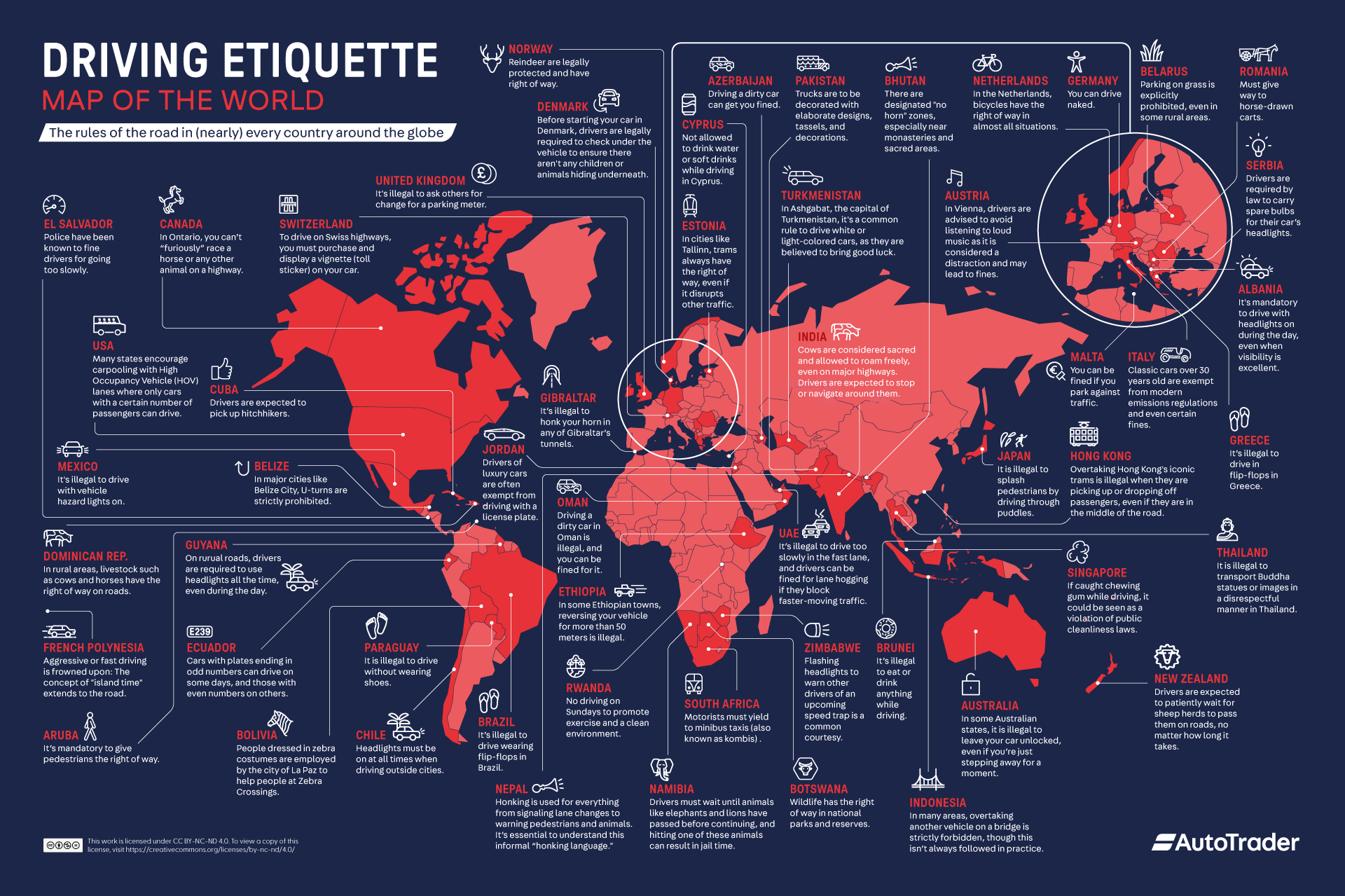
The way we navigate the roads and communicate with other drivers is completely different from country to country. Your legal obligations to carry essential health and safety equipment, how you travel with pets, and even which animals you should give way to (!) all change across borders...
Whilst in the UK you find that other drivers or pedestrians may try to warn you that you've left your headlights on in the daytime, it's actually a legal requirement for drivers to have their headlights on at all times (night and day) in nine countries, including Albania, Bulgaria, Chile, Croatia, Finland, Gabon, Guyana, Serbia and Ukraine. This is primarily in place to help other drivers see the vehicle when there is poor visibility on the roads.
There is also a lot of litigation around the use of the car horn. For example, in Armenia, honking your horn near hospitals, schools, or during funerals is banned, and in Bhutan, there are designated "no horn" zones, especially near monasteries and sacred areas. However, other countries are free and easy with their horns' use. In fact, in Grenada and Fiji, honking your horn is actually a standard non-aggressive form of communication to say hello or to warn others of their presence.
Animals also play a big part in driving etiquette around the world - from drivers being legally required to check under the vehicle to ensure there aren't any children or animals hiding underneath in Denmark to having to give way to sheep in New Zealand, giraffes in Botswana and crabs on Christmas Island. Intriguingly, Bolivian authorities employ people dressed in zebra costumes to help people at zebra crossings in La Paz.
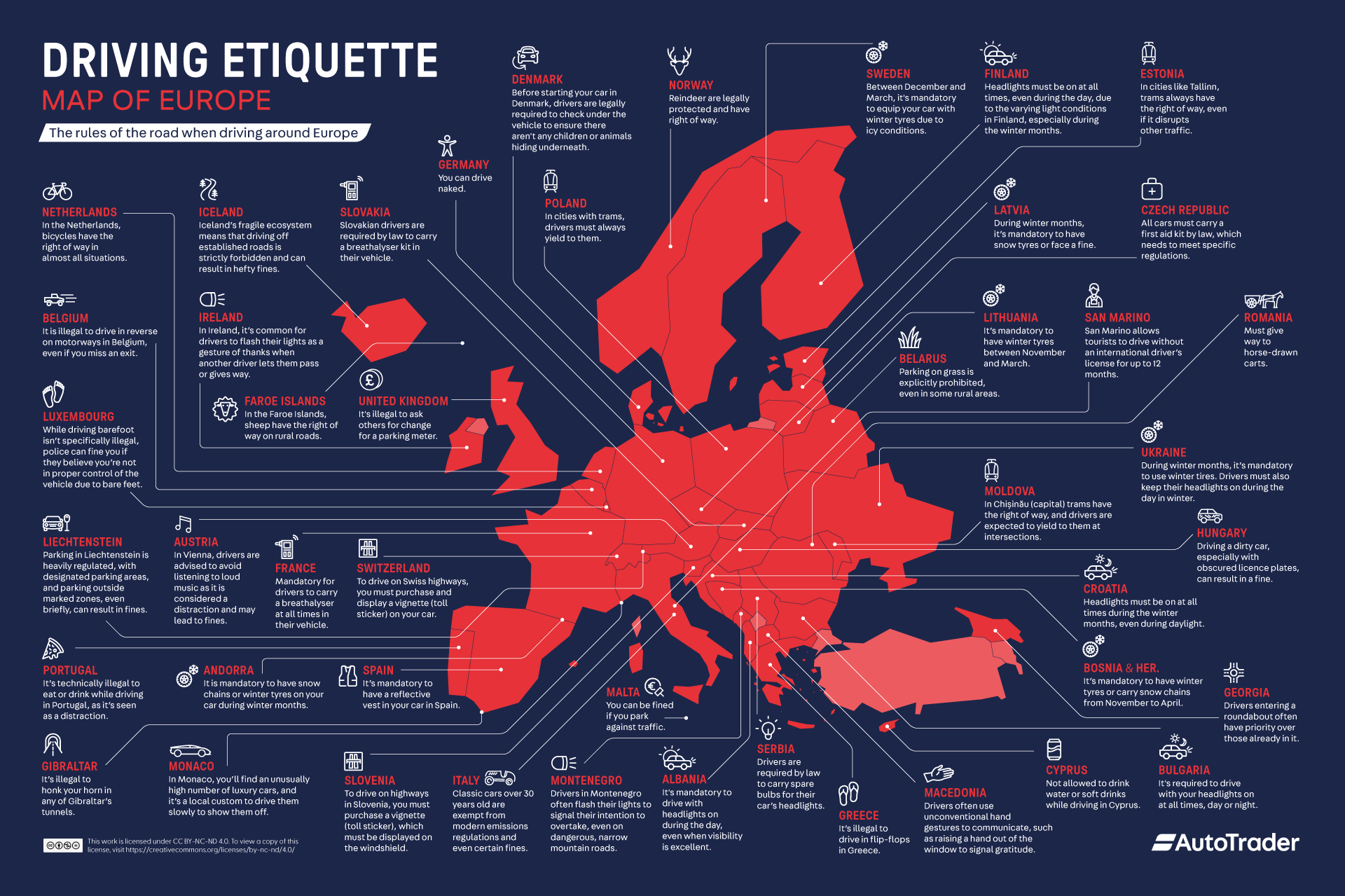
When it comes to driving in Europe, the motto is 'Be prepared'. In the likes of Andorra, Latvia, and some areas of Italy snow tyres are mandatory during the winter months - failing to do so can result in a hefty fine, which can cost more than the price of snow tyres! For drivers in Serbia, motorists' legal safety obligation is to carry spare bulbs for their car's headlights, whilst the French must carry a breathalyser at all times in their vehicle.
Some of the quirkier laws in Europe include it being illegal in the UK to ask others for change for a parking meter, whilst in Germany drivers are legally allowed to drive without wearing any clothing (though this is an uncommon practice!) and motorists are not meant to drink water or soft drinks while driving in Cyprus. There are also many different things that drivers must give way to in Europe and it differs greatly between borders. In the Netherlands bicycles have the right of way in almost all situations; reindeer are legally protected and have the right of way in Norway; in Romania you must give way to horse-drawn carts, and in the Faroe Islands sheep have the right of way on rural roads. A curious clause in Italian law which may be of interest to those who admire the design and aesthetic of classic cars is that classic cars over 30 years old are exempt from modern emissions regulations and even certain fines. So, driving one of these beautiful cars is encouraged in the home of Ferrari and Maserati. A similar law also applies in the UK - classic vehicles that were built more than 40 years ago and have a 'historic tax' class are exempt from the ULEZ charge.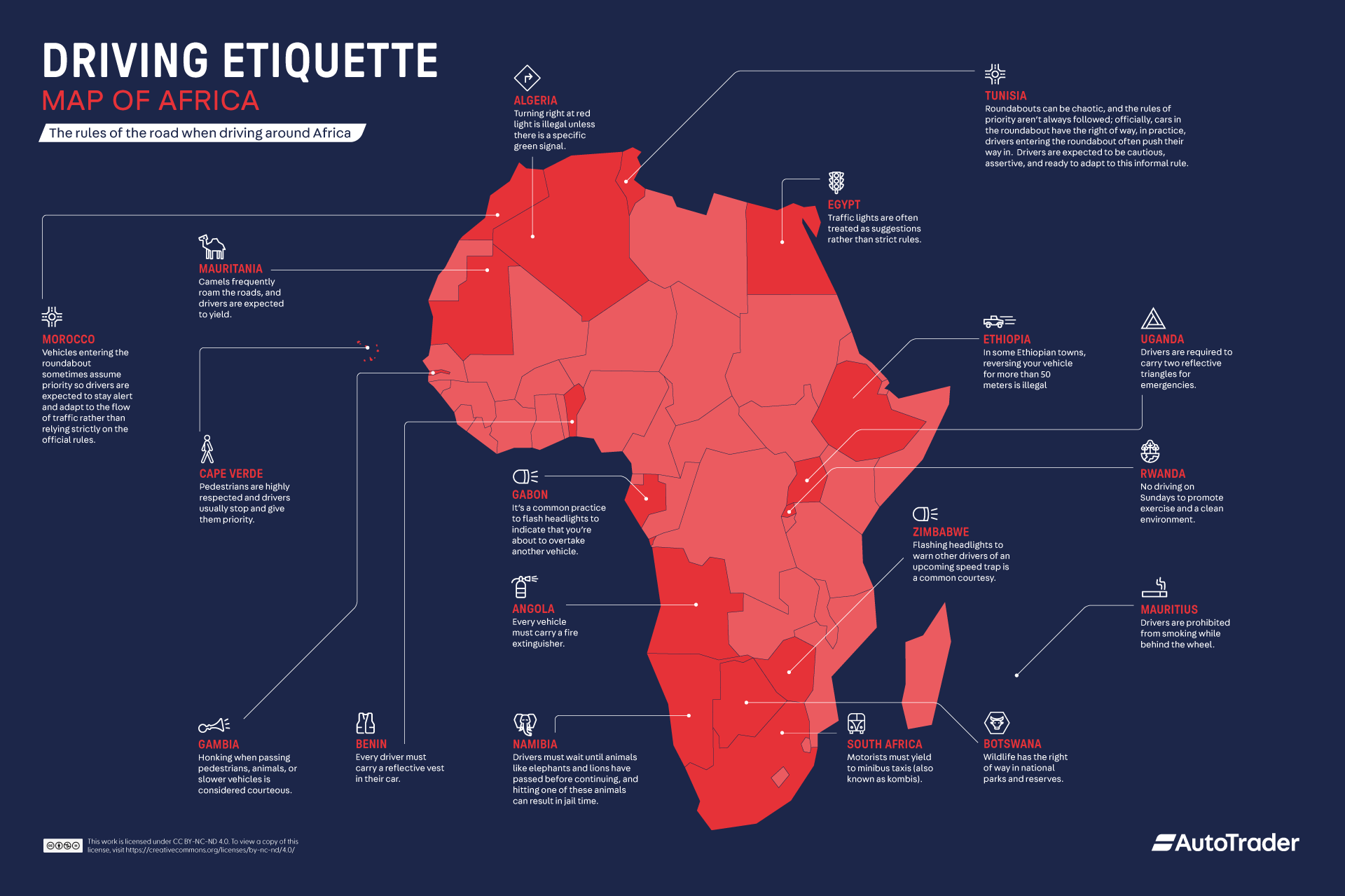
African nations have a plethora of different driving habits and legal requirements. In Botswana, a country home to some of the highest concentrations of lion, giraffe, hippo, wildebeest and buffalo in Africa, plus around 450 bird species, wildlife has the right of way over drivers in national parks and reserves. This rule is also in place in Namibia, where hitting an animal can lead to jail time.
Likewise, in Mauritania, camels frequently roam the roads, and drivers are expected to yield.
Some of the more random driving laws in the continent include it being illegal to reverse for more than 50 metres in Ethiopia, and in Rwanda, there is no driving on Sundays.
There are a lot of regulations around carrying safety equipment in many African countries: for example in Angola, drivers must carry a fire extinguisher; in Uganda, you must carry two reflective triangles for emergencies, and in Benin, you need to have a reflective vest in your car.
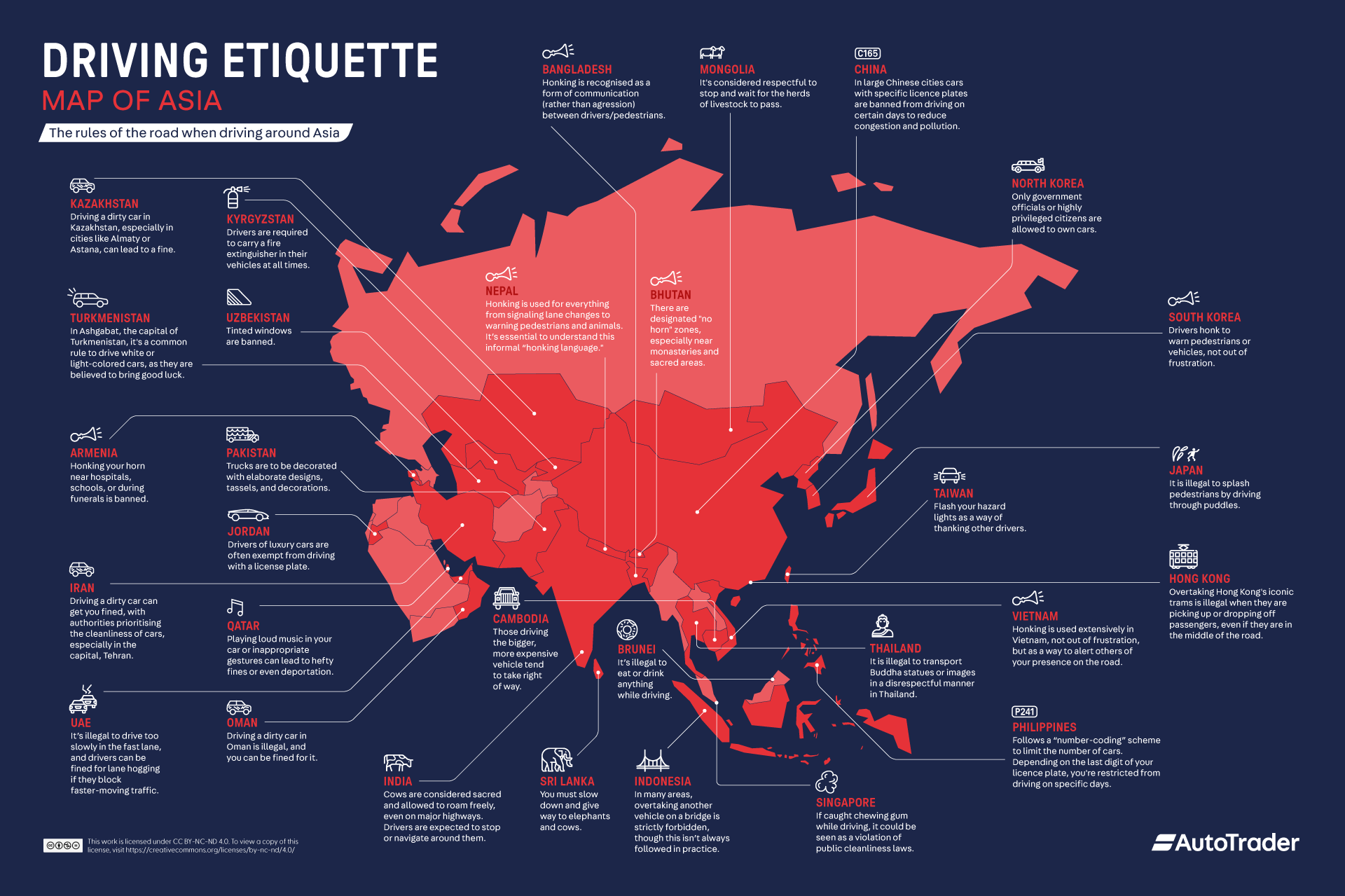
In many Asian countries, it is extremely important to keep your car looking shiny and new. Driving a dirty car in Oman is illegal, and you can be fined for it, which is also the case in Kazakhstan, Iran and Azerbaijan, so never neglect the power of a sponge and some soapy water if you're driving in these countries!
Elsewhere in Asia, some of the rules and regulations may take drivers by surprise. In Thailand, it is illegal to disrespectfully transport Buddha statues or images - for example, it would be considered offensive to have a miniature Buddha statue decorate the interior of your car.
In Ashgabat, the capital of Turkmenistan, it's a common rule to drive white or light-coloured cars, as these colours are believed to bring good luck. Meanwhile, cows are considered sacred and allowed to roam freely in India, even on major highways, so drivers must stop or navigate around them.
If you ever find yourself behind the wheel in the UAE, be aware that it's illegal to drive too slowly in the fast lane, and drivers can be fined for lane hogging if they block faster-moving traffic. So, always check what the speed limit is and pick your lane wisely.
Interestingly, in Jordan, luxury cars are more likely to get away with breaking the rules. In fact, drivers of luxury cars are often exempt from driving with a licence plate - which is a legal requirement for everyone else
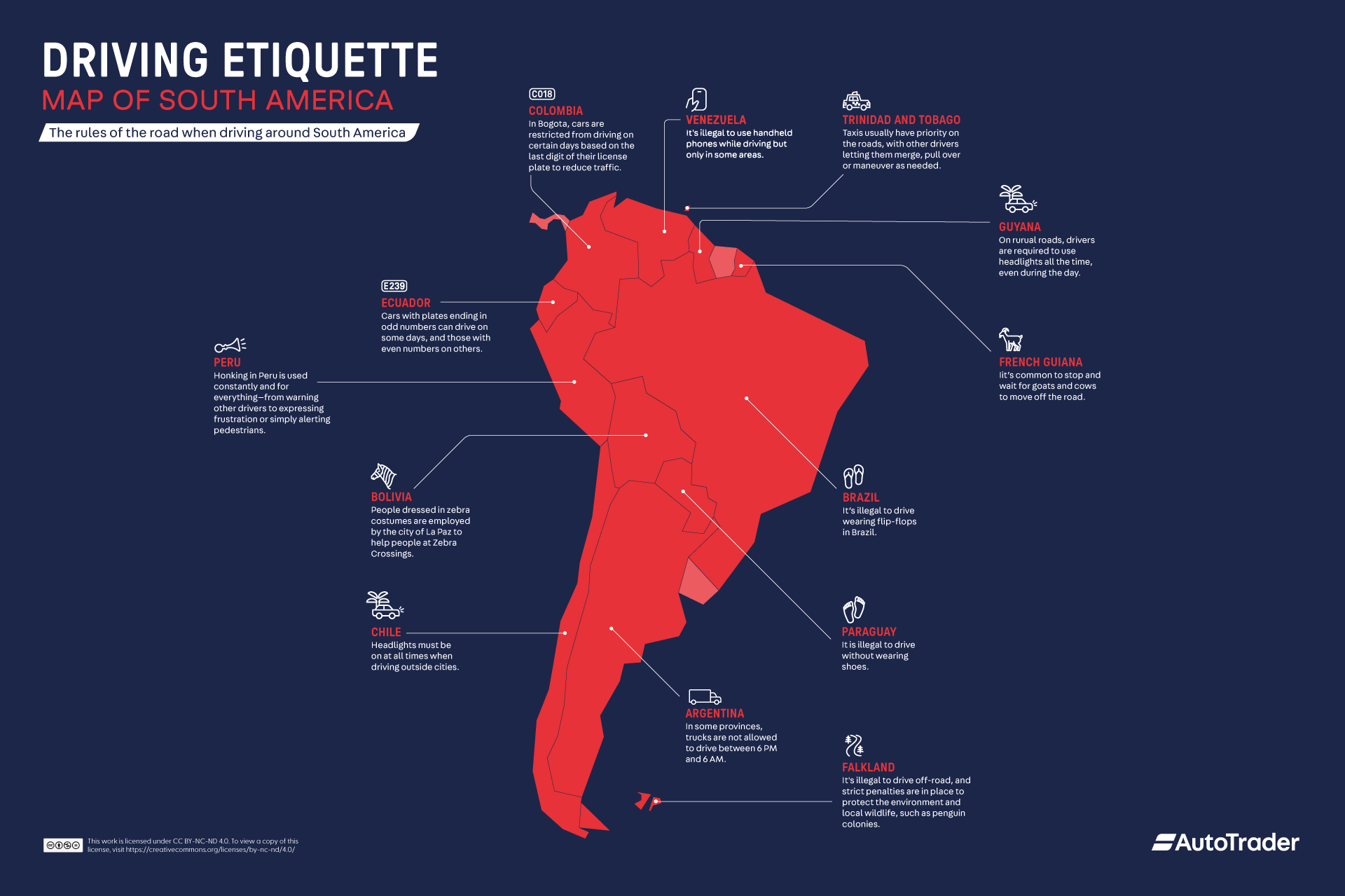
Whilst not a law, don't panic if you notice someone dressed up as a zebra whilst driving in Bolivia - Bolivian authorities have employed people in the city of La Paz to help people at zebra crossings! This has been introduced to make the roads more pedestrian-friendly and to encourage drivers to stop, so be alert to human-looking zebras!
In Brazil, it's illegal to drive wearing flip-flops, whilst in Chile and Guanya you must have your headlights on at all times, even during the day.
Due to increasing levels of traffic, Ecuador has introduced a system where cars with plates ending in odd numbers can drive on some days and those with even numbers on others. This has been introduced to try and manage the troubling traffic experienced in Ecuadorian cities, so make sure you are clued up on your number plate before embarking on your journey.
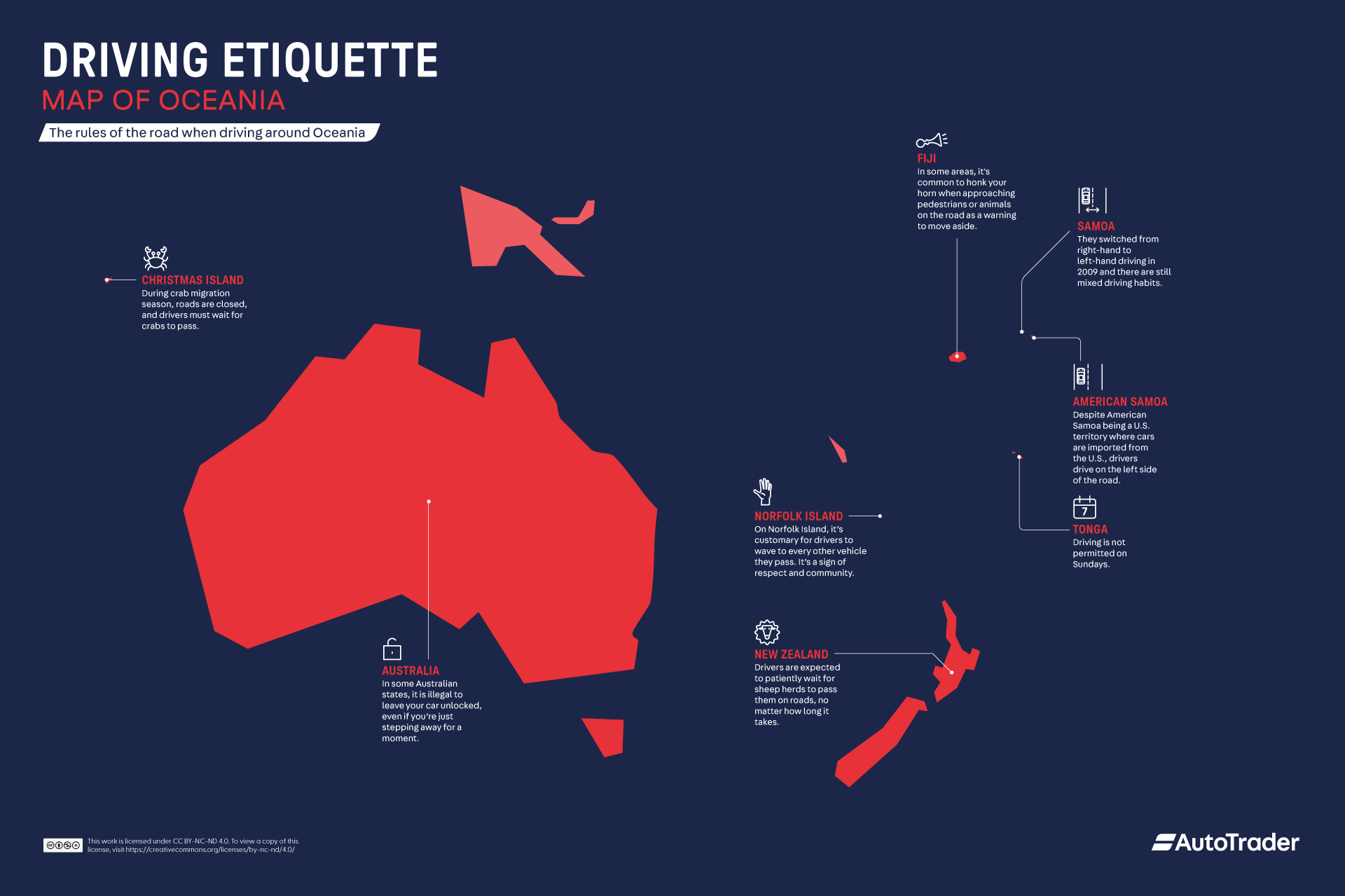
Whilst other countries around the world require drivers to give way to animals, Christmas Island really takes it one step further. During crab migration season, roads on the island are closed and drivers are legally obliged to wait for crabs to pass before continuing with their journey.
Speaking of giving way to animals, drivers are expected to patiently wait for sheep herds to pass them on roads in New Zealand, no matter how long it takes. Considering there are over 25 million sheep recorded in the country in recent reports, you might find yourself waiting for a long time.
The driving etiquette in some Australian states makes it illegal to leave your car unlocked, even if you're just stepping away for a moment. So, make sure you always lock your vehicle if you're travelling around the land down under.
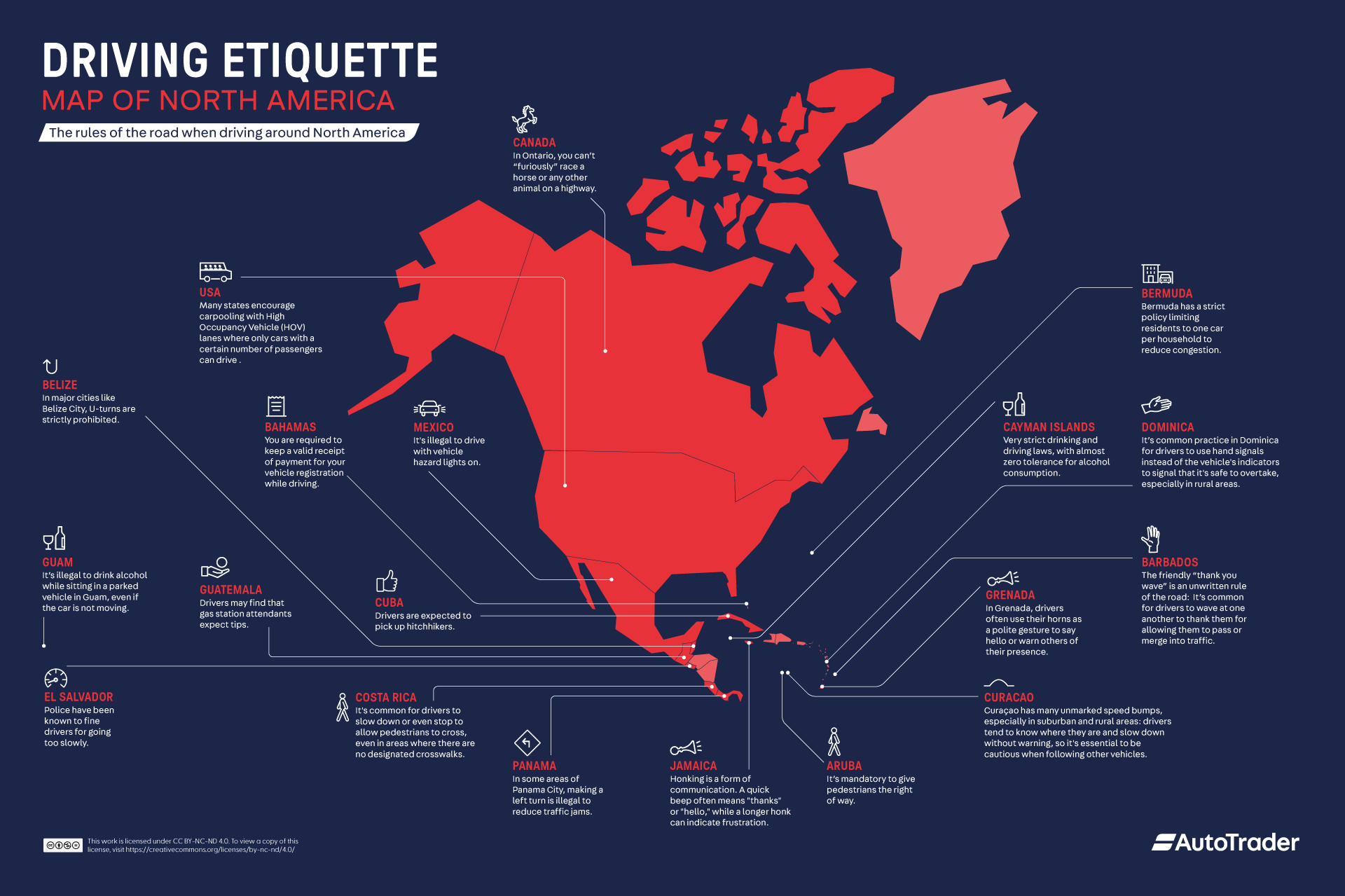
North and Central America is full of bizarre driving regulations. Looking at Canada, our new car experts discovered that in Ontario, you can't “furiously” race a horse or any other animal on a highway. Travelling further south to Cuba, drivers are expected to pick up hitchhikers out of common courtesy.
Whatever you do, don't start driving your car without wearing shoes in Paraguay as this is illegal and you can face fines and even jail time. Elsewhere in the continent, U-turns are strictly prohibited in major cities like Belize City and it's mandatory to give pedestrians the right of way in Aruba.
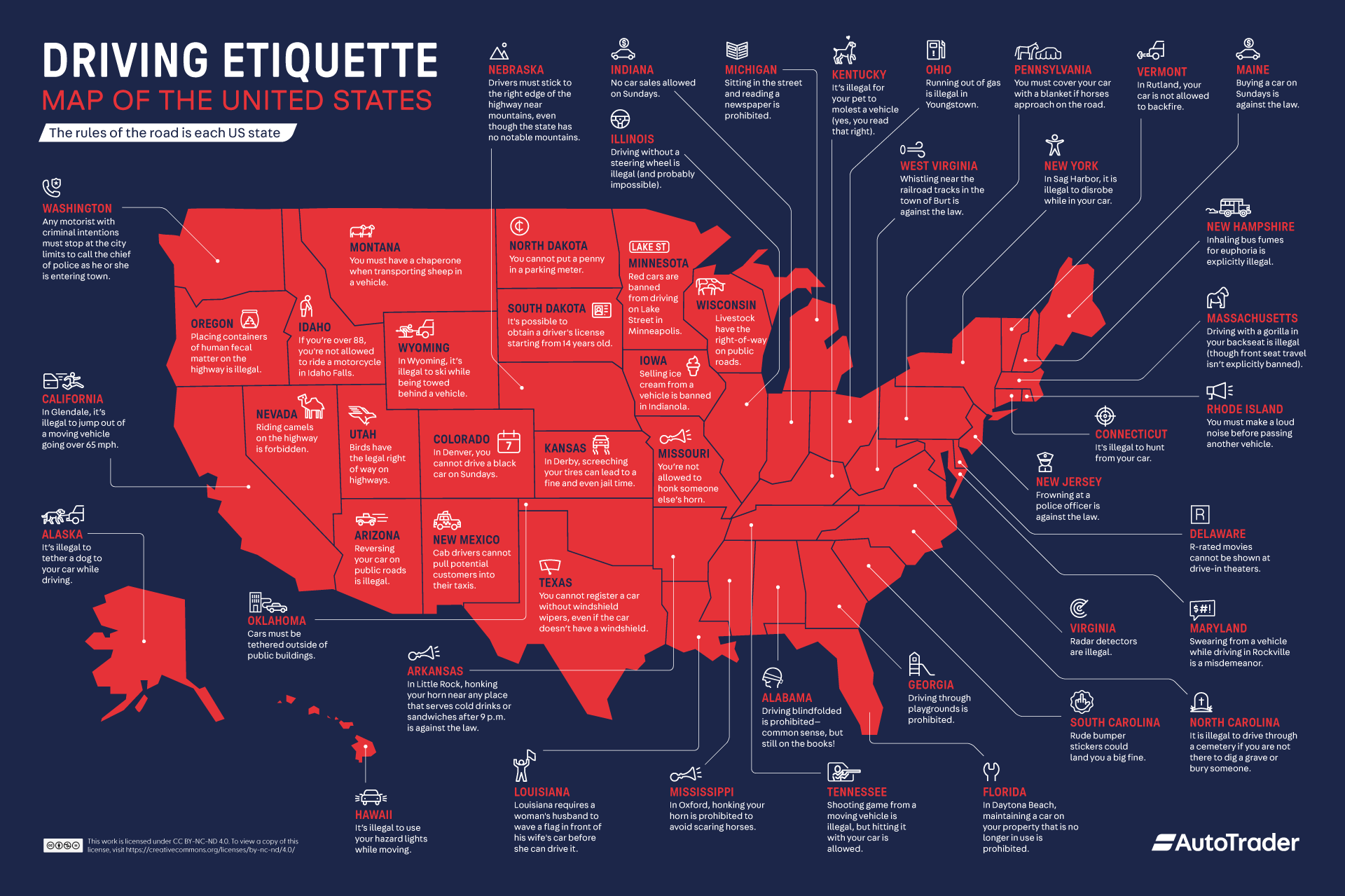
Despite being one nation, driving etiquette around the USA differs dramatically from state to state. In some states you can turn right on a red light for example, and other states you cannot, so those on road trips that cross state boarders should brush up on each state's driving law nuances.
Some of the more bizarre rules that have been introduced in states in recent years include the fact that it is illegal to tether a dog to your car while driving in Alaska. While this law might seem like common sense for most pet owners, it's curious that it had to be written into law. Likewise, driving blindfolded is prohibited in Alabama—common sense, but still on the books! While it may seem obvious, driving without a steering wheel is explicitly illegal in Illinois, whilst in Wyoming it's illegal to ski while being towed behind a vehicle.
Less common sense driven, and more on the random side of USA state laws are rules that include being at risk of a big fine for rude bumper stickers in South Carolina, riding camels on the highway is forbidden in Nevada, and you must have a chaperone when transporting sheep in a vehicle in Montana.
The bizarre rules of the road don't stop there - in Derby, Kansas screeching your tyres can lead to a fine and even possible jail time; R-rated movies cannot be shown at drive-in theatres in Delaware and in Youngstown, Ohio it's illegal to run out of gas!
Whilst it's funny to see some of the more unusual and intriguing driving etiquette around the world, before driving abroad you must check the UK Gov website to check out the essential admin points you need to carry out before starting your travels.
As a general guide, here are some essentials to consider before driving abroad:
We analysed Google search results and reputable country and state-specific driving/legal resources to discover the driving etiquette of 180 countries and all American states. Any country that didn't produce enough data to analyse were excluded from the research.
All data correct October 2024.